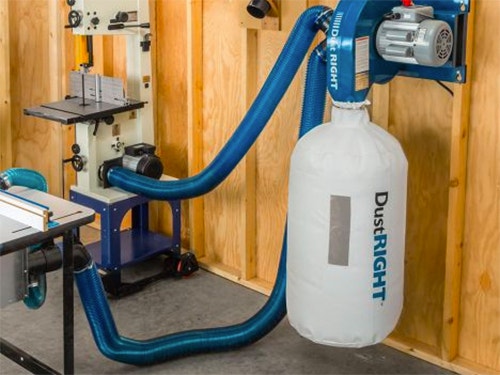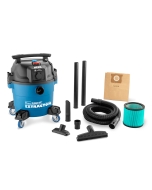What Makes Dust Collection Important?
Whether it’s a large commercial operation, or a weekend woodworker's garage-sized shop, dust collection is an important consideration.
At Rockler Woodworking and Hardware, we concentrate on supplying dust collection equipment and supplies designed specifically for the space, needs and budget of hobbyist and small professional shops.
Designing an effective dust collection system takes planning and a little know-how. In this article, we'll introduce the most important considerations in designing a dust control strategy that really works, and we’ll offer some advice on picking out the dust collection equipment that’s best for your shop. On this page, we’ll begin by pointing out why woodworkers everywhere are beginning to take dust collection seriously.
Respiratory Health
For many hobbyists and owners of small professional shops, a adequate dust collector falls in the "luxury item" category – with so many other tools to buy, a dust collection system that really handles the dust can stay at the bottom of the priority list for a long time. Here are a few reasons to start taking dust seriously right now.
Research continues into the health consequences of long-term exposure to workshop dust. In the debate over the seriousness of the health risks involved in exposure to wood dust, one thing seems to be universally accepted: the risks are real. A quick search on the internet will bring up hundreds of sources of information on the health consequences associated with woodshop dust exposure, including widely recognized organizations like the Occupational Safety and Health Administration (OSHA) Here's an excerpt from its introduction to the topic of Wood Dust and Health:
Wood dust becomes a potential health problem when wood particles from processes such as sanding and cutting become airborne. Breathing these particles may cause allergic respiratory symptoms, mucosal and nonallergic respiratory symptoms, and cancer...
Safety Hazards of Letting Things Go
In many small shops, "dust collection" means breaking out a broom and dust pan at the end of the day. Too many woodworkers routinely climb over piles of shavings kicked out by a thickness planer, or stand on a slippery, quarter-inch carpet of sawdust while they push the last couple of boards in a large stack through their table saw.
As every woodworker knows, it doesn’t take long to cover a shop floor with sawdust and shavings, and it’s easy to put off clearing away a hazardous mess when you’re busy working. And that’s just what many woodworkers do, knowing that it only takes a second to slip or stumble over a pile of debris and end up with an injury that will keep them out of the shop for a long time.
Portable dust collectors are great for handling large dust particles, chips and shavings, and can provide your first line of defense against fine wood dust exposure.
The risk of fire is obvious. If you've ever used kindling to start a fire in a fireplace, you know that wood ignites very easily when it’s cut into small pieces. It takes surprisingly little – a stray spark from a grinder, for example – to ignite the papery shavings and sawdust that your power tools produce. In extreme cases, fine airborne wood dust can reach levels that cause it to be explosive.
A Better Woodworking Experience
Very few woodworkers do their best work while kicking through mountains of shavings and coughing out a cloud of dust. Once you have a dust collection system installed, it will do a lot of the shop clean-up for you – while you work, not afterward. Not only will you have an easier time finding and getting to things in your shop, you'll spend more time woodworking and less time picking up dust.
Safety Hazards of Letting Things Go
Air filtration systems rid the air in your shop of the harmful fine dust particles that your dust collection system misses.
The dust that a wood shop produces can be divided into two general categories: Large dust particles, chips and shavings, and fine wood dust. These two kinds of "dust" each have their own negative effects on your woodworking operation, and each requires a different strategy for adequate control.
Keep the inspiration coming!
Subscribe to our newsletter for more woodworking tips and tricks


